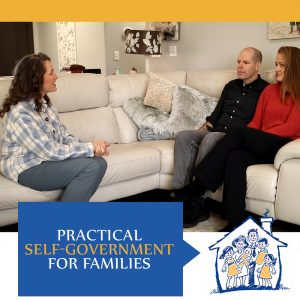Problem Solving Practice While Camping
“Quin, you left a mess in the bathroom! Clean it!” called Paije from the mini bathroom in our comfy travel trailer.
“No, you take care of it.” said Quin.
“Get in here and clean your mess!”
“I’ll do it tomorrow.” he replied without emotion.
At this point, with an attitude problem Paije began to describe the mess she saw in the bathroom. Each time she told her older brother, Quin, to get in there and clean it, he refused.
The communication was not effective, and the loving tone in the trailer was gone.
How To Solve Communication Problems With Children
“Come here Quin. Come here Paije.” I gently said as I motioned for them to come where they could look me in the eyes.
Looking at Quin I said, “A moment ago, your sister told you that something you did offended her. When she brought it to your attention you refused to fix the situation. Whenever you find out that you have offended another person you should apologize and fix the situation however you can unless it would be immoral to do so. So,when your sister told you to fix the situation in the bathroom, you should have said, ‘okay’ and done so.”
“okay” he said.
Looking at Paije I said, “When you spoke to Quin a moment ago your voice tone was not appropriate. You yelled at him and had an attitude problem. You ordered him around and didn’t speak with love or respect. Your voice tone has made the trailer feel less loving and comfortable. What you should have done is kindly go to him, look him in the eyes, and ask him to fix the mess in the bathroom.”
“okay” Paije responded.
At this point each of them agreed that they did not handle the situation well and I instructed them to replay the situation again appropriately; which they happily did.
The Proper Way To Correct A Problem
We all find ourselves in situations when we need a little help problem solving from time to time just like my youth, Quin and Paije, did. Even though they are ages 18 and 16, they still need me to show them how to handle new situations sometimes.
While camping, the messy bathroom situation occurred and Paije didn’t follow the proper family protocol for handling it. The fact that she yelled at him expresses that she didn’t trust that he would fix the problem. She obviously felt she needed sternness to persuade him. Her voice tone also suggested that she didn’t value him at that moment. And, yelling from another room is also a way be sure that the concern will not be addressed by the offender. Quin wouldn’t feel invested in the situation unless he had a connection with Paije first.
If she would have simply gone to him, looked him in the eyes and asked him kindly to correct the problem, he would most likely have recognized the truth he needed to acknowledge; that someone he loved needed his respect and assistance. When we look in people’s eyes and speak to their hearts, they are free to feel the truth of our words.
Paije needed Quin to acknowledge her situation as true. A couple of small adjustments in her presentation would have made this acknowledgment more probable. There is a proper protocol for solving problems, even while camping: Look at the person, keep a calm voice, face and body, express to the person that they are understood, then share the truth they need to hear. Finally, drop the subject.
There is no use allowing ourselves to get ‘worked up’ over a silly situation, no matter how much it bothers us. We are in charge of our own happiness even at ages 18 and 16. Don’t stop helping and teaching children, no matter their ages. Of course, the help looks different once the child has left the home, but while they are there, it is our role to help them learn the skills they need “to become joyful, adults who know what their mission in life is and can’t wait to fight for it, and have solid relationships with God and family..” (Parenting A House United )
Pre-order the NEW children’s book that teaches the Disagreeing Appropriately skill! Paije Takes The Stage






